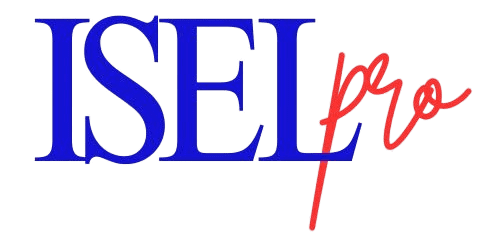🔑Key Takeaways:
- SEL is foundational—as vital as literacy and numeracy.
- SEL drives transformation—empowering learners to address real-world challenges.
- SEL yields measurable impact—improving well-being, academic outcomes, and social cohesion.
- Cultural sensitivity is critical—local adaptation and contextualisation ensure authenticity.
- Whole-system integration—across pedagogy, policy, assessment, and community—is essential.
- Teachers matter most—their well-being and training are critical to SEL’s success.
- SEL complements broader reforms—it is not a substitute but a vital component of systemic change.
The UNESCO guide “Mainstreaming social and emotional learning in education systems: policy guide” (2024) serves as a critical resource for policymakers grappling with the challenges of a rapidly changing world. It argues that traditional academic curricula, while essential, are no longer sufficient to prepare students for the complexities of modern life. The guide posits that social and emotional learning (SEL) is not a supplementary program but a fundamental component of a holistic education system, crucial for fostering peace, sustainable development, and individual well-being.
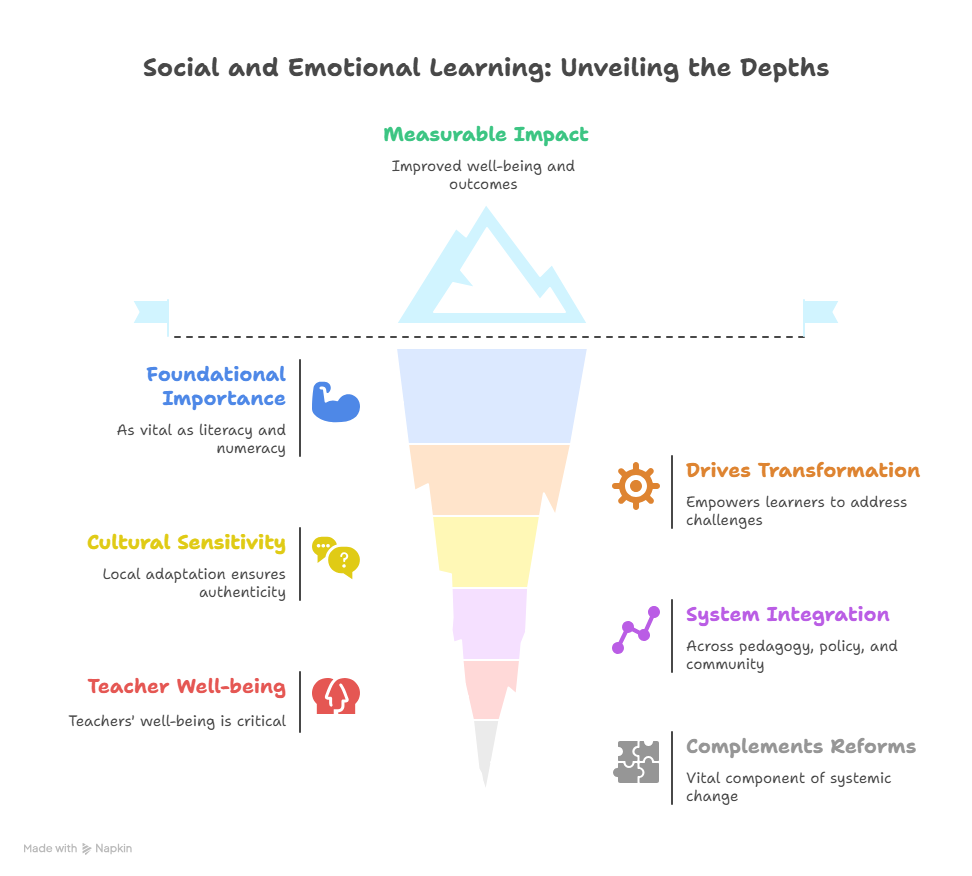
Why Social and Emotional Learning is Key to Transforming Education

The United Nations Educational, Scientific and Cultural Organization (UNESCO), as the lead agency of the Global Education 2030 Agenda, has long advocated for education that extends beyond cognitive achievement.
Its 2024 publication, Mainstreaming Social and Emotional Learning in Education Systems: A Comprehensive Policy Guide, emphasizes the transformative role of Social and Emotional Learning (SEL) in building inclusive, equitable, and future-ready education systems. Drawing on global research and practice, the guide provides policymakers with critical strategies to embed SEL systematically across curricula, pedagogy, teacher training, assessment models, and community engagement.
At its core, SEL is linked to UNESCO’s holistic vision of education: advancing sustainable development, fostering peace, promoting social justice, and empowering learners to become compassionate global citizens.
1. The Global Context:
The guide highlights the stark reality of the current educational landscape. With 250 million children still out of school and many more failing to acquire essential skills, the existing system is falling short. The rise of racism, discrimination, and hate speech underscores a need for education that actively promotes empathy, understanding, and conflict resolution. This is where SEL comes in. It addresses the emotional and relational dimensions of human interaction, which are at the heart of these societal problems.
2. Beyond Academic Achievement:
While often seen as a “soft skill,” SEL has a tangible and measurable impact on academic outcomes. The guide synthesizes research demonstrating that SEL programs lead to:
3. Strengthening Relational Dynamics:
Perhaps most importantly, SEL is a vehicle for social change. It strengthens the emotional and relational fabric of classrooms, schools, and communities. When students and educators are equipped with strong social and emotional competencies, they are better able to:
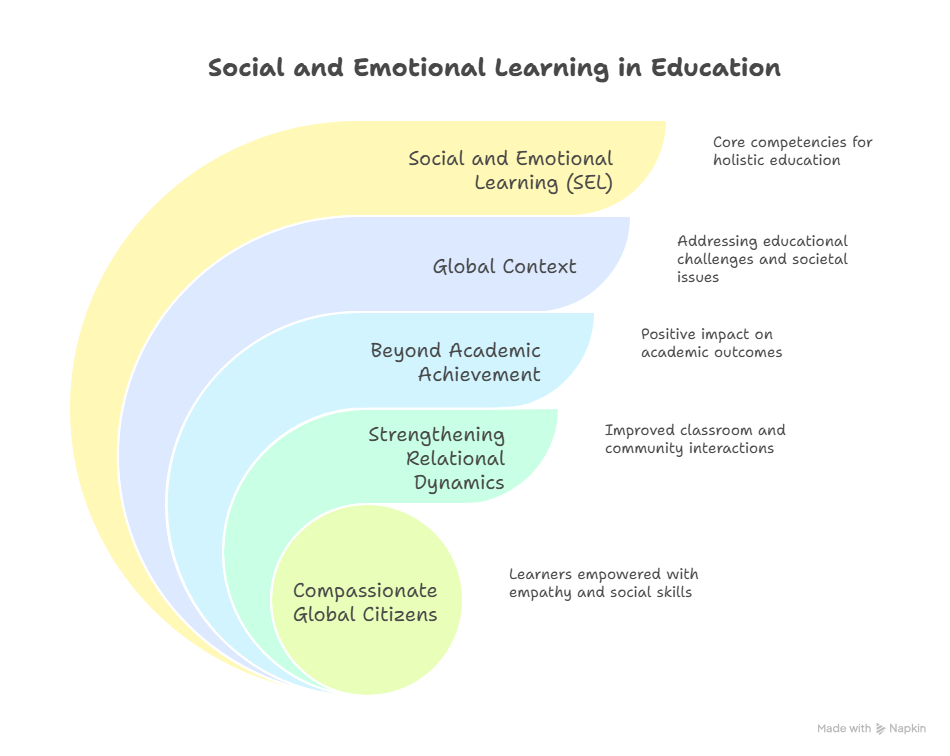
- Promote Inclusion and Equality: SEL helps students understand and appreciate diverse perspectives, fostering a more inclusive environment and challenging biases.
- Foster Sustainable Peace: By teaching empathy and conflict resolution, SEL helps de-escalate tensions and build the foundations for peaceful coexistence.
What You Need to Know: A Deeper Dive into SEL
The UNESCO policy guide highlights the core attributes of SEL worldwide:
- Context-Dependent: The environment, resources, and systemic support determine SEL’s effectiveness.
- Multidimensional: SEL integrates cognitive, affective, behavioural, cultural, and relational aspects.
- Culturally Relevant: SEL must align with local values, traditions, and identities.
- Diversity-Sensitive: No cultural tradition should dominate at the expense of others’ human rights.
- Lifelong and Life-wide: SEL is not confined to classrooms—it spans homes, communities, and workplaces.
- Complementary: SEL strengthens systems of justice, equity, and well-being but is not a substitute for them.
What is Social and Emotional Learning (SEL)?
SEL is defined as the process through which individuals acquire the skills to:
- Understand and manage emotions.
- Build positive and supportive relationships.
- Make ethical, responsible decisions.
- Show empathy and compassion.
- Develop an inclusive sense of identity.
- Contribute to peaceful and sustainable societies.
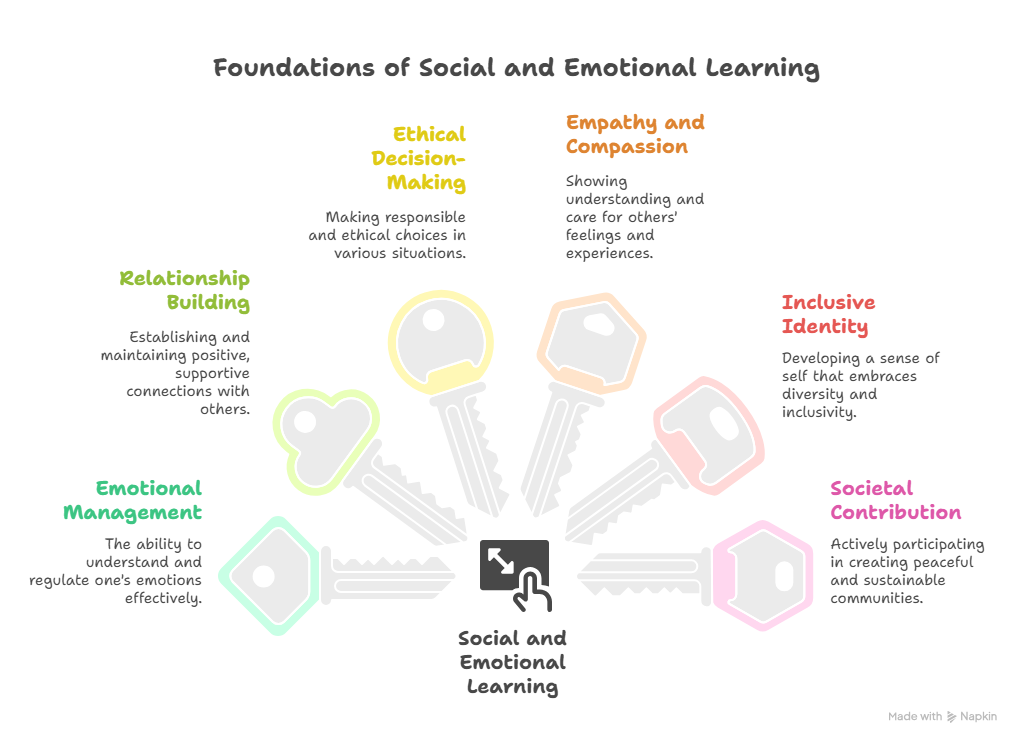
It moves education beyond academics to cultivate the whole learner—blending cognitive, emotional, social, cultural, and behavioural dimensions. Rooted in an ethics of care, SEL seeks both personal well-being and collective transformation.
Why SEL Matters
The integration of SEL into education has been shown to yield tangible, evidence-based benefits:
- Better academic attainment and stronger retention in schools.
- Improved mental health and resilience against stress, anxiety, or trauma.
- Reductions in bullying, harassment, substance abuse, and school dropouts.
- Healthier interpersonal relationships and greater empathy.
- Enhanced employability and workplace readiness.
- Stronger recovery post-crisis, whether due to conflict, emergencies, or displacement.
- More equitable, inclusive classrooms that reduce discrimination and social exclusion.
At a broader level, SEL helps education systems respond to pressing global challenges such as climate change, conflict, digital misinformation, and widening inequalities. By embedding SEL, education serves not just individuals, but societies striving for peace, justice, and sustainable development.
General Characteristics of SEL
The UNESCO policy guide highlights the core attributes of SEL worldwide:
- Multidimensional: SEL integrates cognitive, affective, behavioural, cultural, and relational aspects.
- Culturally Relevant: SEL must align with local values, traditions, and identities.
- Diversity-Sensitive: No cultural tradition should dominate at the expense of others’ human rights.
- Lifelong and Life-wide: SEL is not confined to classrooms—it spans homes, communities, and workplaces.
- Complementary: SEL strengthens systems of justice, equity, and well-being but is not a substitute for them.
- Context-Dependent: The environment, resources, and systemic support determine SEL’s effectiveness.
Policy Considerations and Case Studies for Implementation
The guide moves beyond theory to provide concrete guidance for policymakers. It argues that mainstreaming SEL requires a systemic approach, not just the implementation of standalone programs.
This publication builds upon UNESCO’s prior work on SEL, which includes perspectives from Global Citizenship Education (GCED) and Education for Sustainable Development (ESD), foundational health and well-being education, and the Happy Schools Framework. It incorporates insights from earlier guidance materials and research within the education sector.
For instance, a 2019 UNESCO study that examined GCED and ESD learning dimensions in curricula across 10 countries found that while SEL was present, its inclusion varied significantly across educational levels and subject matter. The study also revealed that SEL was more prevalent in GCED-related content (e.g., cultural diversity, human rights) than in ESD, which tended to focus more on cognitive and action-oriented dimensions.
Drawing on contributions from multiple UNESCO Offices and Institutes, including the Mahatma Gandhi Institute of Education for Peace and Sustainable Development (MGIEP), this guide broadens the understanding of SEL as an expansion of the educational process. It shifts from an exclusive focus on cognitive aspects towards a more balanced approach that integrates cognitive, social, emotional, and behavioural/action-oriented dimensions of learning.
The publication stresses the need for expanding SEL’s research foundations through comparative and longitudinal studies, incorporating diverse voices from various contexts and a wider range of educational and social science disciplines. It also calls for a critical review and evaluation of SEL from global contexts and its cultural contextualisation.
Ultimately, for SEL to promote social justice within and beyond education, its mainstreaming must be guided by principles of human rights, cultural diversity, and the full spectrum of principles outlined in the 2023 Recommendation on Education for Peace, Human Rights and Sustainable Development.
Key Policy Recommendations for Mainstreaming SEL
The UNESCO guide provides actionable directions for governments and stakeholders:
1. Defining and Prioritising SEL
- Recognise SEL as foundational, as important as literacy or numeracy.
- Frame SEL within a humanistic vision, supporting both personal growth and social justice.
- Ensure cultural contextualisation so SEL reflects local values, practices, and worldviews.
2. Curriculum and Pedagogy
- Carefully weave SEL into existing content and hidden curricula, instead of overloading students.
- Adopt active pedagogies such as problem-based learning, collaboration, and service learning.
- Leverage digital tools responsibly, safeguarding privacy and ensuring inclusivity.
- Embrace teaching methods that empower learner agency and voice.
3. Assessment
- Rethink evaluations to balance cognitive and non-cognitive competencies fairly.
- Involve students actively in shaping assessment.
- Develop context-specific, inclusive, and bias-free tools.
- Use monitoring for continuous improvement, not punitive rankings.
4. Teacher Education and Well-being
- Provide comprehensive teacher training on SEL integration, emphasizing self-reflexivity and resilience.
- Support teachers in navigating systemic stressors affecting both them and their students.
- Prioritise teacher mental health, job security, and safe working conditions.
5. School Leadership
- Build participatory leadership models that engage all stakeholders in SEL planning.
- Position schools as community hubs of care and connection.
- Encourage leadership that integrates student well-being, inclusivity, and social justice into daily practice.
6. Community and Learner Inclusion
- Expand SEL beyond classrooms by involving families, community leaders, and social institutions.
- Promote system-wide approaches rooted in equity and justice.
- Draw inspiration from cultural wisdoms such as Ubuntu (Africa) or Buen Vivir (Latin America).
- Ensure adequate financial and institutional support so SEL becomes a core system component, not a peripheral project.
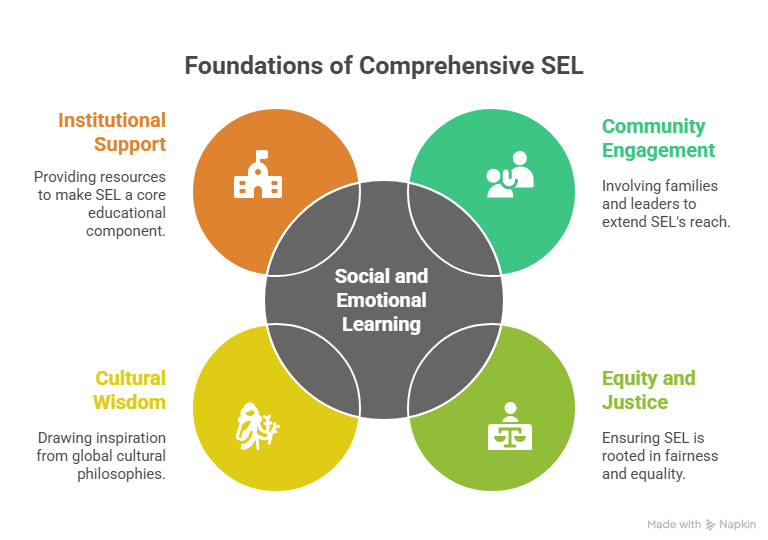
SEL Across Global Education Agendas
SEL is not a new concept—it builds upon decades of UNESCO’s initiatives in:
- Global Citizenship Education (GCED)
- Education for Sustainable Development (ESD)
- Health and Well-being Education
- Happy Schools Framework
By mainstreaming SEL, education systems not only align with Sustainable Development Goal 4 (quality education) but also contribute to achieving all 17 SDGs by nurturing agents of peace, justice, and sustainability.
In the end
The Mainstreaming Social and Emotional Learning in Education Systems guide underscores that SEL is not a luxury or optional add-on. By systematically integrating SEL across curricula, pedagogy, teacher preparation, assessments, leadership, and communities, education systems can nurture learners who are academically competent, socially empathetic, emotionally resilient, and civically engaged.
